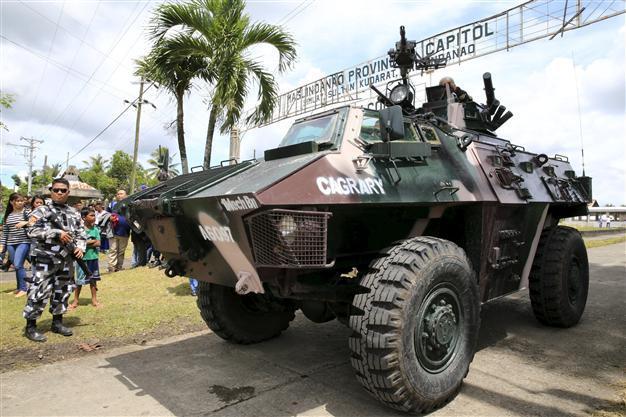$3bn ADB lending boost to help end Philippines Muslim rebellion
MANILA - Agence France-Presse

A government armored personnel carrier is seen at the main gate where the Ceremonial Turnover of Weapons and Decommissioning of Moro Islamic Liberation Front (MILF) Combatants is held at the old capitol in Simuay town of Sultan Kudarat, Maguindanao province, southern Philippines June 16, 2015. Reuters Photo
The Asian Development Bank is to lend about $3 billion to the Philippines over the next three years, part of which will help support a peace deal ending a long-running Muslim insurgency, a joint statement said July 28.The loan -- up 66 percent from the $1.8 billion agreed for 2015-2017 -- will help the Philippines build roads and other infrastructure, improve its basic education system and reform its capital markets, said the statement issued jointly with the Philippine government.
Bank president Takehiko Nakao said boosting lending to the country was in part aimed at "supporting the government in its effort to bring lasting peace and development" to the Catholic nation's Muslim south.
His comments come after a peace deal was struck in March last year with the country's largest Muslim rebel group, aimed at ending decades of fighting that has claimed 120,000 lives.
Parliament is currently debating a proposed law to grant minority Muslims self-rule in the violence-racked area, which President Aquino hopes will be passed before next year.
The government also plans to pour large amounts of aid to the region, and the ADB said it is now working with local authorities to prepare a development plan.
The bank will also help the government raise adult literacy and improve job prospects for residents there, the statement added.
The Muslim rebellion, which began in the early 1970s, has plunged the region into widespread poverty with poor infrastructure like rutted roads, rudimentary ports, and schools destroyed due to intermittent fighting between government forces and communist guerrillas.
Rebuilding basic infrastructure, as well as improving literacy levels, would help the region attract business investment necessary to create jobs to help its people get out of poverty.
















